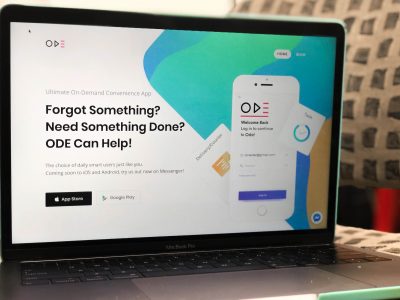
A group of students at Boston University have released a new service called ODE which allows students to pay and be paid for cross-campus on-demand delivery services such as picking up groceries or delivering a forgotten laptop charger.
Shakya Adikari, a junior in the Questrom School of Business and one of the developers of ODE, said he and his team are trying to tap into the “odd job” market.
“Our whole goal is just basically to build a platform that would allow us to be the middleman, that would connect people with their needs, with the supply,” Adikari said.
Currently, the service exists as a chatbot on Facebook messenger. After a quick setup, anyone at BU can use the bot to request food, laundry or shopping delivery, as well as a courier to deliver items they may have left somewhere. Their request will be matched up with someone who is available to make the delivery at that time.
“Currently, we do roughly around 20 orders per day,” Adikari said. “Since we’re so heavily focused on college campuses, we really wanted to find a way to give back to students, and especially giving students a way to make money in their day today.”
The startup’s co-founders, Adikari and Questrom junior Harkirat Modi, are developing this app with three other students, Matt Sloan, Faraz Samnani and Avisha Goyal.
ODE is being developed with the help of Innovate@BU through a service called the Innovation Pathway. This service gives students with ideas access to resources, mentorship and funding.
Shena Lohardjo is the startup manager at Innovate@BU and runs the center’s Innovation Pathway program. Lohardjo wrote in an email she has been providing help and support to the team at ODE.
“I believe they are a committed, driven and entrepreneurial team with a lot of potential,” she wrote. “I look forward to seeing what they accomplish!”
Adikari said Innovation Pathway has been “almost like an incubator” for their idea.
“It’s been a really big help,” Adikari said, “because we’ve been able to find teammates and also find individuals that can help the conversation keep moving.”
Currently, the delivery fee for the ODE service varies based on distance. The fee ranges from $2.99 to $5.99, with cross-campus deliveries being the most expensive. Eighty percent of the delivery fee goes to the “runner” who delivers the good, and ODE keeps 20 percent as the middleman.
Adikari said in order to ensure accountability among its runners, it requires they submit their BU ID number, and offers live customer support if any issues arise.
Adikari said the inspiration for ODE grew out of a Facebook group he was in with his friends that they used for quick favors.
“It worked really well in our own friend group, and other people were like, ‘can I get on this Facebook group as well?’” Adikari said. “We just realized that, why don’t we just make this into a proper service?”
Adikari said he hopes the service will eventually have a mass audience and be able to offer more than just delivery services. He also said he hopes ODE can connect people who offer haircuts or tutoring, or any odd job one can think of.
“Our long-scale vision is really to become a peer-to-peer platform that’s really helping you to try to get any kind of service you’re looking for done,” Adikari said.
ODE’s next step will be expanding onto nearby college campuses.
“We’re hoping that in this next upcoming semester, we can really kind of finalize our structure here and replicate our success at local universities, hopefully scaling into Northeastern [and] MIT,” Adikari said. “You can easily replicate this business model at other universities.”
Maria Parada Rodriguez, a sophomore in the College of Engineering, said she thinks ODE could be really successful on campus, especially if it utilizes dining points.
“I have so many leftover dining points that I could definitely utilize that overusing Uber Eats or Postmates or something else,” Rodriguez said. “I think that’s actually an excellent idea.”
Megan Robison, a sophomore in the Sargent College of Health and Rehabilitation Sciences, said she thinks the service sounds like a good idea but probably wouldn’t use it to get items delivered.
“It sounds like a pretty good idea,” Robison said. “If I were to partake in it I might sign up to be the deliverer. I don’t think I would actually use the service.”
Yoni Tobin, a sophomore in the College of Arts and Sciences, said he would like to know more about the service, though it’s probably something he would utilize.
“It sounds like a good service, there’s a lot of demand for something like that,” Tobin said. “I could see myself using it.”
Correction: A previous version of this article didn’t state the “on-demand” aspect of the service, referred to Shakya Adikari as “she” instead of “he,” and did not include the names of the other members of the startup. The current version reflects these changes.














